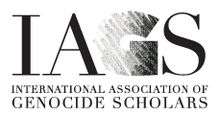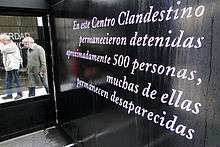International Association of Genocide Scholars

The International Association of Genocide Scholars (IAGS) is an international non-partisan organization that seeks to further research and teaching about the nature, causes, and consequences of genocide, and to advance policy studies on the prevention of genocide.[1][2][3][4][5] A central aim of the association is to draw academics, activists, artists, genocide survivors, journalists, jurists, and public policy makers into the study of genocide.
The association, founded in 1994 by Israel Charny, Helen Fein (its first president), Robert Melson, and Roger Smith, focuses on comparative research, recent works, case studies, the links between genocide and other human rights violations, and prevention and punishment of genocide. This information is published in Genocide Studies and Prevention, the official peer-reviewed academic journal of the association.[6]

History
The first meeting of the IAGS was held at William and Mary College in Virginia in the summer of 1995, with about 30 or so scholars being present; today, there are dozens of panels and hundreds of participants. Among the attendees at this first meeting were Jack Nusan Porter, Herbert Hirsch, and Henry Hutttenbach. Prof. Steven Katz's controversial paper, contending that the Holocaust (Shoah) was the only "true" genocide, was read by Jack Nusan Porter. The first biennial conference was held in Montreal, Canada under the auspices of Concordia University and the Montreal Institute for Genocide Studies; the second biennial was held at the University of Wisconsin-Madison in 1999; the third was held at the University of Minnesota in 2001; the fourth at the Irish Centre for Human Rights, National University of Ireland, in 2003; the fifth in Boca Raton, Florida, at the Florida Atlantic University in 2005; the sixth and largest to date was held in Sarajevo, Bosnia, sponsored by the University of Sarajevo in 2007; the seventh in Arlington, VA at George Mason University, School for Conflict Resolution, in 2009; the eighth in Buenos Aires at the Universidad Nacional de Tres de Febrero in 2011; the tenth is Siena, Italy in 2013; the eleventh in Winnipeg, Canada, University of Manitoba, in 2014; the twelfth in Yerevan, Armenia in 2015; and the thirteenth biennial meeting was held in Brisbane, Australia at the University of Queensland in 2017.
In 1997, the association unanimously passed a formal resolution affirming the Armenian Genocide,[7][8] and also sent an open letter to the Prime Minister of Turkey.[9] In December 2007 the organization passed another resolution reaffirming the Armenian Genocide and officially recognizing both the Greek and Assyrian Genocides.[10]
Officers
Officers of the association in 2009-2011 were:
- President, William Schabas
- First Vice-President, Alex Hinton
- Second Vice-President, Daniel Feierstein
- Secretary/ Treasurer, Jutta Lindert
Former presidents
The following persons have been president of the association:
- Helen Fein
- Frank Chalk
- Robert Melson
- Roger Smith
- Israel W. Charny
- Gregory H. Stanton
References
- ↑ Forsythe, David P. (2009). Encyclopedia of Human Rights. Oxford University Press. pp. 4–. ISBN 978-0-19-533402-9.
- ↑ Totten, Samuel (2007). The Prevention and Intervention of Genocide: An Annotated Bibliography. Routledge. pp. 1097–. ISBN 978-0-415-95358-0.
- ↑ Totten, Samuel; Pedersen, Jon E. (January 2012). Educating about Social Issues in the 20th and 21st Centuries: A Critical Annotated Bibliography. IAP. pp. 422–. ISBN 978-1-61735-572-1.
- ↑ Bartrop, Paul R. (30 July 2012). A Biographical Encyclopedia of Contemporary Genocide. ABC-CLIO. p. 389. ISBN 978-0-313-38679-4.
- ↑ Ball, Howard (2011). Genocide: A Reference Handbook. ABC-CLIO. p. 271. ISBN 978-1-59884-488-7.
- ↑ "IAGS Journal". Homepage. International Association of Genocide Scholars. Retrieved 22 March 2015.
- ↑ Lewy, Guenter (15 April 2012). Essays on Genocide and Humanitarian Intervention. University of Utah Press. p. 5. ISBN 978-1-60781-187-9.
- ↑ MacDonald, David B. (2008). Identity Politics in the Age of Genocide: The Holocaust and Historical Representation. Routledge. p. 135. ISBN 978-0-415-43061-6.
- ↑ Henham, Ralph; Behrens, Paul (1 February 2013). The Criminal Law of Genocide: International Comparative and Contextual Aspects. Ashgate Publishing. p. 17. ISBN 978-1-4094-9591-8.
- ↑ International Association of Genocide Scholars Archived 2008-02-27 at the Wayback Machine.